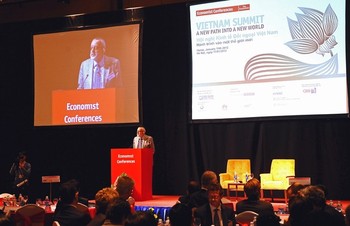Vietnam - January, 11th 2012
Vietnam Summit Finding a Way Forward 2012

Unido and The Economist together for the “Finding A Way Forward 2012” Vietnam Summit
Hanoi, 11th January 2012. “Vietnam is seeking to conduct economic restructuring and create favorable conditions for investors and enterprises to do business in the country”, Deputy Prime Minister Hoang Trung Hai said at the “Finding a Way Forward 2012” Vietnam Summit, held in Hanoi on the 11th of January. “The Vietnamese Government is determined to create the most favorable business environment and a level playing field for all economic sectors”, he said and continued “Enterprises are a driving force of a country. If enterprises fail, the country and its Government also fail”.
The event, which involved some of the most important figures from politics and academia, as well as from economics and finance, has been organized by The Economist and supported by UNIDO. The conference offered an interesting and broad view about new investment opportunities and perspectives from this South-East Asian country, as well as foreign investors attitudes in respect of these opportunities.
UNIDO has been represented by the Head of the Clusters and Business Linkages Unit, Mr. Gerardo Patacconi, who concluded the “Foreign Investor Panel”, introducing UNIDO’s activities carried out in this country.
Mr. Charles Goddard, editorial director of the Economist Intelligence Unit in Asia-Pacific, said that Vietnam has seen rises in foreign investment in the country over the past time. The Economist forecasts that the Southeast Asian country’s economy would expand by 7.2% per year in the 2011-2015 period, due to strong growths in consumption, investment and exports.
UNIDO ITPO Italy has been pleased to partecipate in this event’s organization, representing a big opportunity to witness the fruitful exchange of advises and experiences.
TECHNICAL NOTES
Since the political reforms started in 1986 and aimed at creating a market development oriented economy (the so-called “doi moi” policy), Vietnam benefited from high and constant economic growth rates, which were only partially slowed down by the Asian crisis in 1998 and 1999, and the global 2008-2009 crisis.
Successful socio-economic reforms, 65% of the under 30 population with a high literacy rate and benefiting from a special individual care, as well as families and authorities towards the improvement of the level of education, and foreign investments are among the factors which make Vietnam one of the most interesting markets in Asia.
Moreover, during the 2010-2011 period Vietnam has been characterized by a sustainable GDP growth rate, whereas the rate of population living under the poverty line has substantially declined.
Despite the numerous positive changes, many problems still challenge the country. In fact, in sharp contrast with the economic growth of the last years, uncertainty and inflation threats seem to draw close to Vietnam.